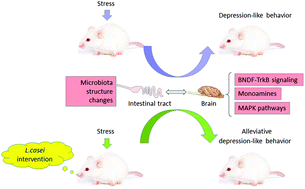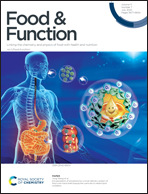Lactobacillus casei improves depression-like behavior in chronic unpredictable mild stress-induced rats by the BDNF-TrkB signal pathway and the intestinal microbiota
Abstract
Lactobacillus casei (L. casei), a kind of probiotics, is known as a “healthy triple benefit bacterium” along with Lactobacillus acidophilus and Bifidobacterium. L. casei is associated with the alteration of the intestinal flora population, and the gut microbiota–brain axis has been demonstrated to play an important role in many central nervous system diseases. The aim of this study was to evaluate the effectiveness of L. casei intervention in ameliorating mental disorders and potential mechanisms using a rat model with depression-like behaviour induced by chronic unpredictable mild stress (CUMS). L. casei intervention improved the CUMS-induced depression-like behaviors of rats, including a reduced body growth rate, decreased sucrose preference, increased immobility time, and lowered moving distance and velocity. In addition, L. casei intervention amended the gut microbiota structure changes induced by CUMS in rats. Furthermore, L. casei intervention reversed the CUMS-induced protein expression changes of monoamines dopamine, noradrenaline and 5-hydroxytryptamine, brain-derived neurotrophic factor (BDNF) and its receptor tyrosine kinase receptor B (TrkB), and N-methyl-D-aspartic acid receptor 1, as well as CUMS-induced activations of ERK1/2 and p38 MAPK signal pathways. These findings suggested that L. casei could significantly protect against depression in rats, which was possibly associated with the alterations in the gut microbiota composition and mediation of BDNF–TrkB signaling.



 Please wait while we load your content...
Please wait while we load your content...